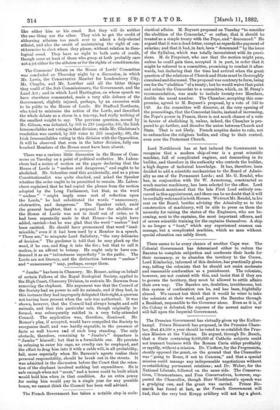The French Government has taken a notable step in eccle-
siastical affairs. M. Boysset proposed on Tuesday "to consider the abolition of the Concordat," or rather, that it should be treated as a simple treaty with the Pope, and" denounced." He argued that it was a dead-letter, except as regards the payment of salaries; and that it had, in fact, been " denounced " by the issue of the Syllabus, which was totally inconsistent with its provi- sions. M. de Freycinet, who saw that the motion might pass, unless he could gain time, accepted it in part, in order that it might be referred to a committee, promising to combat it after- wards, but declaring that the time had arrived when the great question of the relations of Church and State mast be thoroughly examined and discussed. The proposal was contrary to form, being one for the "abolition " of a treaty; but he would waive that point and submit the Concordat to a committee, which, on M. Steeg's recommendation, was made to include twenty-two Members, double the usual number. The Chamber, accepting this com- promise, agreed to M. Boysset's proposal, by a vote of 343 to 149. As the committee will discover, at the very opening of the proceedings, that the Concordat limits, instead of increasing, the Pope's power in France, there is not much chance of a vote in favour of abolishing it, unless, indeed, the Chamber is pre- pared to go farther, and dissolve the union between Church and State. That is not likely. French sceptics desire to rule, not to enfranchise the religious bodies, and cling to their control, even over the Protestant Church..


































 Previous page
Previous page